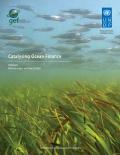

Renewable energy together with energy efficiency, sustainable transport, sustainable agriculture, sustainable tourism, green building and waste management are economic sectors which are often considered capable of paving the way for a transition to a green economy and providing win-win solutions offering job creation, poverty alleviation and environmental protection. However, there are a number of obstacles and challenges that might inhibit these sectors in their contribution towards greening the economy. These include limited knowledge and awareness relevant to green economy and green jobs, gaps in policy and regulations, limited financial incentives to support green initiatives, and related awareness and skill shortages.
This study assesses progress in the Arab region towards the green economy. It reviews the adoption and implementation of policies to support the transition and examines the achievements of different sectors. The study identifies challenges and highlights potential opportunities for countries to green their economies. Given their vital economic role, the study focuses on the transition of small and medium enterprises (SMEs) to greener processes, products and services.
This study aims to provide a methodology for mapping the progress in the Arab region in the adoption and implementation of green economy policies. This mapping is proposed as a policy tool for governments of the ESCWA Region. As such, it is designed to identify the various challenges that the region faces as they still strive to achieve sustainable development, and to highlight potential opportunities for countries in the region to “green” their economies.
The study relies on a set of indicators that represent the transition to a green economy at the macro and micro level. Those indicators are based on those developed by the OECD, UNEP, and UNIDO, and adapted in such a way as to also reflect key social goals, such as the need for greater focus on social equity and poverty eradication. The papar includes a fact sheet of each of the countries in the Arab region, and detailed reports on four pilot countries: Egypt, Jordan, Lebanon, and Oman.
In order to harness opportunities afforded by an inclusive green economy approach, UNDP supports an array of nationally-defined development activities, applying corporate best practices incorporating environmental, governance, poverty reduction, capacity development, and gender perspectives. UNDP looks at its operations which have as many as possible of the following characteristics:
• emphasize the efficient and sustainable use of natural resources in a low-carbon pathway
• decrease (or protect against) environmental risks, emissions and pollution
• lead to increased income opportunities and/or employment generation
• lead to greater social equity and inclusion.
